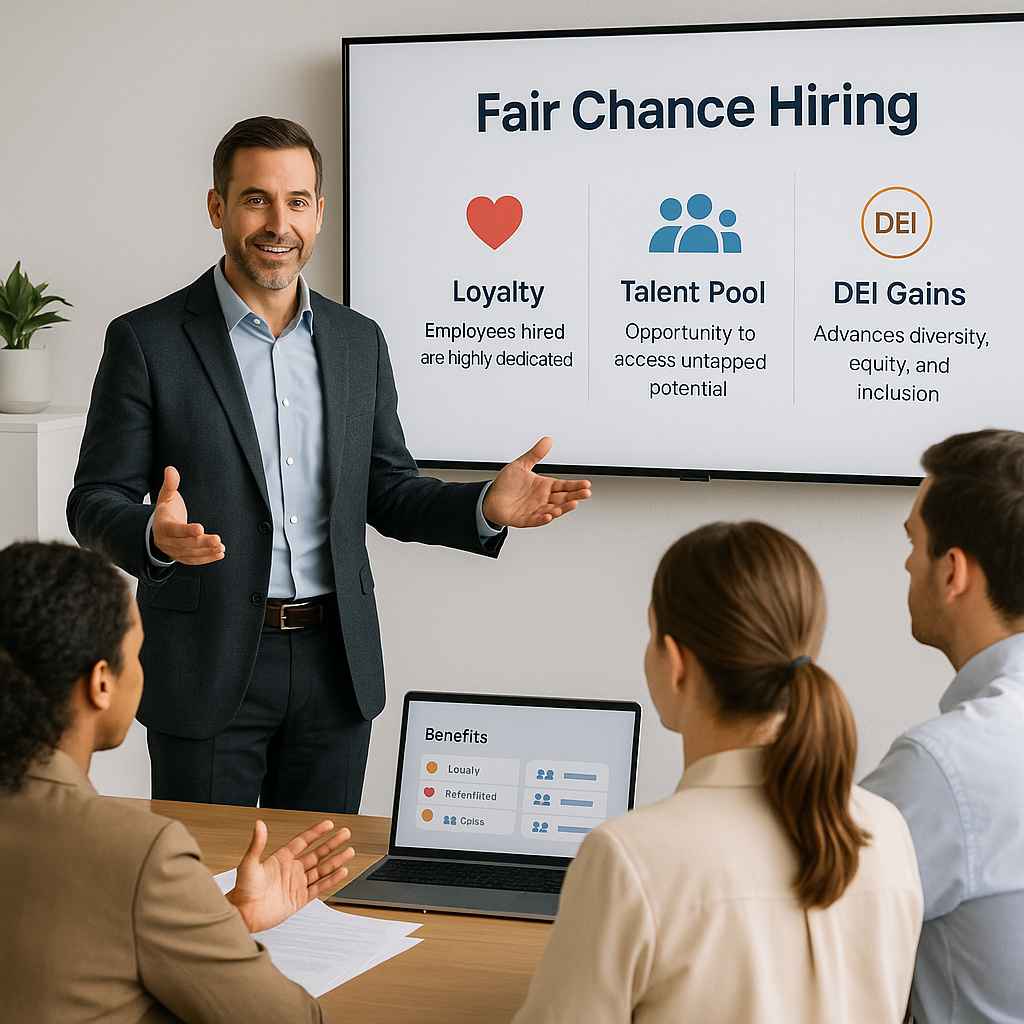Hiring shouldn’t be about someone’s past—it should be about their potential.
That’s the principle behind fair chance hiring: the practice of giving candidates with prior convictions or gaps in their resumes a genuine opportunity to compete for jobs based on merit. For CEOs and business leaders, this isn’t just a social good—it’s a smart talent strategy.
Let’s unpack what fair chance hiring really means, why it matters, and how you can apply it to build a stronger, more inclusive workforce.
What Exactly Is Fair Chance Hiring?
At its core, fair chance hiring is about removing unnecessary barriers that prevent people with criminal records or unconventional backgrounds from entering the workforce.
This means:
- Delaying background checks until later in the hiring process (“ban the box”)
- Focusing on current qualifications and job fit, not just the past
- Providing clear, consistent evaluation criteria
- Ensuring hiring decisions are fair, unbiased, and compliant
It’s not about ignoring someone’s history—it’s about looking at the whole person, their skills, their growth, and their future potential.
Why Should CEOs Care About Fair Chance Hiring?

Because it’s not just the right thing to do—it’s also good for business. Here’s why:
| Benefit | Why It Matters |
| Larger Talent Pool | One in three Americans has a criminal record. Fair chance hiring gives you access to a vast, often overlooked labor pool. |
| Loyal, Hardworking Employees | Fair chance hires often bring high levels of commitment and job satisfaction. |
| Improved DEI Outcomes | It supports diversity, equity, and inclusion efforts with measurable impact. |
| Enhanced Employer Brand | Companies practicing inclusive hiring tend to attract socially conscious customers and employees. |
| Regulatory Compliance | Many regions have Fair Chance Hiring Laws. Adopting compliant practices helps you avoid legal risks. |
If you’re already exploring fair hiring practices, this is a natural extension. In fact, a growing number of policy experts and organizations advocate for this shift. This employer-focused policy brief by NELP outlines the case for fair chance hiring with compelling business and societal benefits that CEOs should take seriously.
What Makes a Hiring Process “Fair Chance”?
A fair chance hiring process involves more than just policy changes. It’s a cultural shift.
1. Delay Background Checks
Avoid asking about criminal history in the initial application. Instead, let the candidate showcase their skills first.
2. Structure Your Interviews
Use structured interviews and consistent evaluation rubrics to reduce unconscious bias. You can read more in our blog on reducing bias in hiring.
3. Train Your Team
Educate hiring managers on fair chance policies and how to evaluate applicants based on relevant job criteria.
4. Provide Second Chances with Support
Consider programs that help fair chance hires transition smoothly, like mentorship or training during onboarding.
Real-World Example: How Employers Are Making It Work

Some of the most respected companies have embraced fair chance hiring—including Walmart, CVS, and JP Morgan Chase. You can explore more in our blog: 10 US Companies Leading the Way in Fair Chance Hiring.
They’ve proven that with structure, support, and the right policies, hiring people with past convictions doesn’t just work—it can outperform traditional recruitment.
How Does Fair Chance Hiring Compare to “Fair Hiring”?
Fair hiring is the umbrella concept. It includes any effort to make hiring practices more inclusive, ethical, and bias-free. Fair chance hiring is one crucial pillar under that umbrella, specifically focused on people with barriers to employment.
Explore the full scope of fair hiring here:
Fair Hiring Explained: What It Means and How to Do It Right
Best Practices for Implementing Fair Chance Hiring

| Best Practice | Description |
| Job-Relevant Evaluations | Only consider background information if it directly impacts the role. |
| Compliance with Laws | Know your local Fair Chance Hiring or Fair Hiring Act requirements. |
| Documentation | Keep written justifications when rejecting candidates based on background checks. |
| Open Communication | Be transparent with candidates about your process. |
Need help writing a compliant policy? Here’s a great resource: Fair Hiring Policy Template
Related Pages
- Fair Hiring in Banking: How the Act Impacts Financial Institutions
- EEOC Compliance in Hiring: What You Need to Know
- Automated Hiring Fairness: Can Tech Help?
- What Makes a Fair Hiring Agency?
FAQs
What is the goal of fair chance hiring?
It’s about giving individuals with records or barriers a legitimate opportunity to compete for jobs, based on their current qualifications and potential.
Is it risky to hire someone with a criminal record?
Not necessarily. When done thoughtfully, fair chance hiring has been shown to reduce turnover and increase employee loyalty. It’s about making informed, job-relevant decisions.
How is fair chance hiring different from diversity hiring?
Fair chance hiring focuses specifically on candidates with criminal records or similar barriers. It overlaps with DEI but serves a distinct, often underserved, population.
Do I have to comply with any specific laws?
Yes—many states and cities have Fair Chance Hiring Laws. It’s smart to align with them, even if not legally required, to future-proof your practices.
Can automation help ensure fair hiring?
Absolutely. Read how automation can reduce bias and increase consistency in our guide: Can Automation Make Hiring Fairer?
Final Thoughts
If you’re serious about building a diverse, equitable, and high-performing team, fair chance hiring isn’t just a nice idea—it’s a competitive advantage.
It challenges outdated assumptions. It opens doors to untapped talent. And most importantly, it reflects a future-focused, inclusive business mindset.




